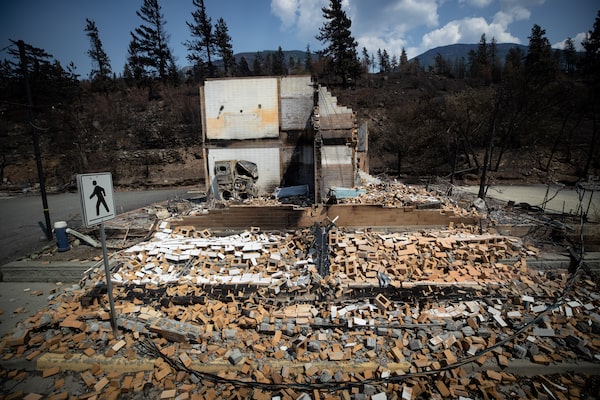Good morning,
Two sisters have been imprisoned since 1994 for a murder another person confessed to.
A woman forced her way into a school to flee an abusive father and ended up going to prison for breaking and entering.
Another woman confessed to murdering a fellow inmate, whose death correctional staff and fellow prisoners continued to believe was actually a suicide.
These are just four of 12 Indigenous women profiled in a new report from a group of Canadian senators who want the cases to be reviewed for possible miscarriages of justice owing to racial and gender bias.
Their demands land on Justice Minister David Lametti’s desk at a critical moment for the criminal justice system. The federal government is overhauling its conviction-review process while also working to contain soaring rates of Indigenous incarceration.
This is the daily Morning Update newsletter. If you’re reading this on the web, or it was forwarded to you from someone else, you can sign up for Morning Update and more than 20 other Globe newsletters on our newsletter signup page.
The pandemic housing boom is winding down. Economists forecast a 10-20% price correction
Economists are predicting that Canadian home prices will fall as much as 20 per cent this year as higher interest rates begin to hit the country’s booming real estate market.
Mortgage rates are expected to climb again as the Bank of Canada aggressively hikes interest rates to deal with runaway inflation. Economists expect higher borrowing costs will lead to a significant price drop in some of the hottest markets.
Toronto-Dominion Bank economist Rishi Sondhi forecasts a double-digit percentage decline in the national average home price over the March to December period this year. Bank of Montreal senior economist Robert Kavcic predicts a 10-per-cent to 20-per-cent drop in the home price index in certain regions.
- Rob Carrick: The priced-out home buyer’s guide to falling real estate prices and rising mortgage rates

A damaged structure is seen in Lytton, B.C., on Friday, July 9, 2021, after a wildfire destroyed most of the village on June 30.DARRYL DYCK/The Canadian Press
Firefighters didn’t stand a chance against fast-moving Lytton fire, report says
The wildfire that engulfed the community of Lytton, B.C., last summer approached fast and simultaneously from four fronts, leaving no realistic chance that firefighters could have prevented the destruction and loss of life, a forensic investigation concludes.
But the summary report by the Institute for Catastrophic Loss Reduction gives British Columbia a failing grade for its approach to wildfire emergency response, because it has put too much emphasis on suppressing fires, and not enough on creating “ignition-resistant” communities.
The Lytton Creek fire started on June 30, in the middle of a record-breaking heat wave, including the Canadian record high of 49.5C on June 29. The heat created strong winds channelled through the steep slopes of the Fraser River canyon.
- Ottawa proposes one-year timeline for returning victims of climate disasters to normal life
- U.K. movement No Mow May gains traction across Canada as municipalities urge residents to let their grass grow
Got a news tip that you’d like us to look into? E-mail us at tips@globeandmail.com Need to share documents securely? Reach out via SecureDrop
ALSO ON OUR RADAR
Ontario leaders debate pandemic, Highway 413: Ontario’s opposition leaders took aim at Doug Ford’s handling of the pandemic and his $10-billion proposed Highway 413 at the province’s televised debate last night, with some of the most tense moments erupting as the PC Leader faced criticism over COVID-19 and climate change.
- Liberal candidate for Brampton East contradicts Del Duca on Highway 413
- John Ibbitson: With the debates now finished, only two factors could shake up Ontario election
- Editorial: The province needs more electric power, cleaner power and cheaper rates. Which party has the answer?
- Explainer: Ontario election platform guide: What the PCs, NDP, Liberals, Greens and Ontario Party promise if elected June 2
Google warns about Ottawa’s Online News Act: In a detailed criticism of the federal government’s Online News Act, Google Canada stated the bill would likely make Canada’s news industry worse off and would hurt Canadians’ ability to find quality information.
Kenney, Wilkinson out of sync on energy security: Alberta Premier Jason Kenney will sit in front of the U.S. Senate committee on energy and natural resources in Washington today and make a pitch: Help get another pipeline built to further fortify North American energy security. But Natural Resources Minister Jonathan Wilkinson threw cold water on any hopes from Alberta for a new oil pipeline, saying that he’s heard no interest for one during previous conversations with the White House.
Deaths in Quebec LTC homes point to failure of officials: The mass deaths in Quebec nursing homes during the first wave of COVID-19 stemmed not just from a lack of resources and personnel but also from officials who had tunnel vision and failed to apply the basic precautionary principle, a coroner says in her report about the province’s handling of the crisis.
Online searches for far-right content surge in Canada: Online searches for “The Great Replacement” – a conspiracy theory apparently followed by the white man charged with killing 10 people in a Black neighbourhood grocery store in Buffalo – have surged in Canada in the past year, according to a recent report presented to the federal government’s public-safety committee.
- Officials say Buffalo gunman taunted law enforcement online
- Campbell Clark: Time for potential leaders to say which conspiracy theories they reject
Flames, Oilers face off in Battle of Alberta: Johnny Gaudreau’s Game 7 overtime winner on Sunday night helped the Calgary Flames shake their reputation of playoff underachiever and set the stage for the first Battle of Alberta since Theo Fleury was sliding across the ice on his knees after scoring a memorable overtime winner of his own in 1991.
MORNING MARKETS
World markets gain: Asian shares led a global rally on Tuesday on optimism about an easing of China’s crackdowns on tech and COVID-19, but concerns about rising prices worldwide set a nervy tone in markets as investors wait for more signals from policymakers. Around 5:30 a.m. ET, Britain’s FTSE advanced 0.67 per cent. Germany’s DAX and France’s CAC 40 gained 1.4 per cent and 1.56 per cent, respectively. In Asia, Japan’s Nikkei finished up 0.42 per cent. Hong Kong’s Hang Seng jumped 3.27 per cent. New York futures were positive. The Canadian dollar was trading at 78.03 US cents.
WHAT EVERYONE’S TALKING ABOUT
Tim Kiladze: “Until now, rising interest rates have been a convenient scapegoat for the suffering.... But interest rates alone don’t explain the shift. What we’re seeing now follows a pattern that was also present in each of the ugliest market collapses of the past three decades.... In each and every one of those market routs, our psychological flaws played a prominent role.”
TODAY’S EDITORIAL CARTOON

Brian Gable/The Globe and Mail
LIVING BETTER
More evidence a Mediterranean diet improves depression
Observational studies have tied eating a Mediterranean diet to a lower risk of developing depression in adults, adolescents and children. This eating pattern has also been found to be helpful in treating depression in middle-aged adults. Now, a study published online this month in the American Journal of Clinical Nutrition has shown that improving diet quality significantly eased depressive symptoms in young men. What’s more, mood improvements occurred within a short time frame.
MOMENT IN TIME: MAY 17, 1943

The Eder Dam on 17 May 1943 showing damage from a Dambuster attack.German Federal Archives
Allies target German dams in bold raid
It was one of most audacious Allied raids of the Second World War. “Operation Chastise” called for the bombing of several large hydroelectric dams in Germany’s Ruhr Valley in an effort to disrupt Nazi industrial production. Conventional weapons, though, couldn’t penetrate the torpedo netting that protected the dams. The answer: specially developed backspun drum bombs, which bounced across the surface of the water (like a skipping stone), spun down a dam wall on contact and then exploded near the base. The payload had to be delivered at a precise altitude, speed and distance from the target. Hand-picked crews from the Royal Air Force 617 Squadron carried out the mission, which required flying at tree-top level. Those involved considered it a one-way ticket. Among the brave crews was Flight Sergeant Ken Brown, from Moose Jaw, who piloted a modified Lancaster bomber that set off just after midnight on this day in 1943. Both the Moehne and Eder dams were successfully breached. But the earthen Sorpe dam remained largely intact even after Mr. Brown scored a direct hit on his eighth pass over the mist-shrouded target. Of the mission’s 19 aircraft, eight – carrying 53 men – never returned. The survivors, including Mr. Brown, would go down in military history as the famed “Dambusters.” Bill Waiser
Read today's horoscopes. Enjoy today's puzzles.
If you’d like to receive this newsletter by e-mail every weekday morning, go here to sign up. If you have any feedback, send us a note.